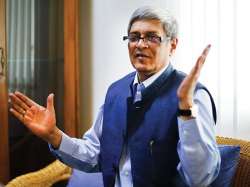Tax agriculture income; remove exemptions on personal income tax: NITI Aayog
Debroy also suggested that exemptions on personal income tax should be removed to increase tax base from the current about 37 million (3.7 crore) in the country of 1.3 billion (130 crore) of people.

Making a strong case for widening the taxpayer base, the NITI Aayog has recommended that the farm income should be taxed as the same threshold as personal income.
"On expanding the base on the personal income tax side, other than elimination of exemptions, is to also tax rural sector, including agriculture income above certain threshold," NITI Aayog member Bibek Debroy told reporters here on Tuesday.
Debroy also suggested that exemptions on personal income tax should be removed to increase tax base from the current about 37 million (3.7 crore) in the country of 1.3 billion (130 crore) of people.
Debroy’s comments assume significance as it comes in the backdrop of reports that the government is already planning to do away with personal income tax exemptions.
Under new income tax slabs announced in the Budget this year, income up to Rs 2.5 lakh is exempt from tax, while 5 per cent is imposed on income between Rs 2.5 lakh and Rs 5 lakh. The tax on income between Rs 5 lakh and Rs 10 lakh is 20 per cent plus Rs 12,500, while above Rs 10 lakh it is 30 per cent plus Rs 1,12,500.
However, taxing agricultural income will require an amendment to the Income Tax Act and cannot be purely an executive decision.
The development is contrary to the government’s position which had earlier assured that agriculture income will not be brought under the tax policy.
Taxing agriculture income is a politically sensitive issue and successive governments have refrained from doing so.
As recent at March 22, Finance Minister Arun Jaitley had assured Parliament, "Agriculture income is not taxed and will not be taxed".
When asked what should be the threshold of imposing income tax on rural sector, Debroy said that it could be decided after taking into account the average income of either three years or five years.
"I don't believe in artificial distinction of rural and urban, so whatever is the threshold on personal income side on urban side, should be the exactly same on rural side. At best what I can do because it is an agriculture income, instead of using agriculture income for one particular year, what I could do is I average it over three-year period or may over five years period as agriculture income is subject
to annual fluctuations, barring that threshold should be the same," Debroy, a noted economist, explained.
Prior to NITI Aayog’s recommendations, Chief Economic Adviser (CEA) Arvind Subramanian had suggested in the Economic Survey that taxing the well-off in the agricultural segment would help widen the taxpayer base.
Between 2007-08 and 2015-16, an estimated 2,746 entities and individuals each declared agricultural income of at least Rs 1 crore.
NITI Aayog had called reporters for briefing on its three-year draft action agenda for accelerating the economy.
NITI Aayog Vice-Chairman Arvind Panagariya, who was present at the press conference, however refrained from answering questions on taxation of agriculture income.
In May 2016, the Prime Minister's Office had advised the NITI Aayog to prepare documents on 15-Year Vision, Seven-Year Strategy and Three-Year Action Agenda.